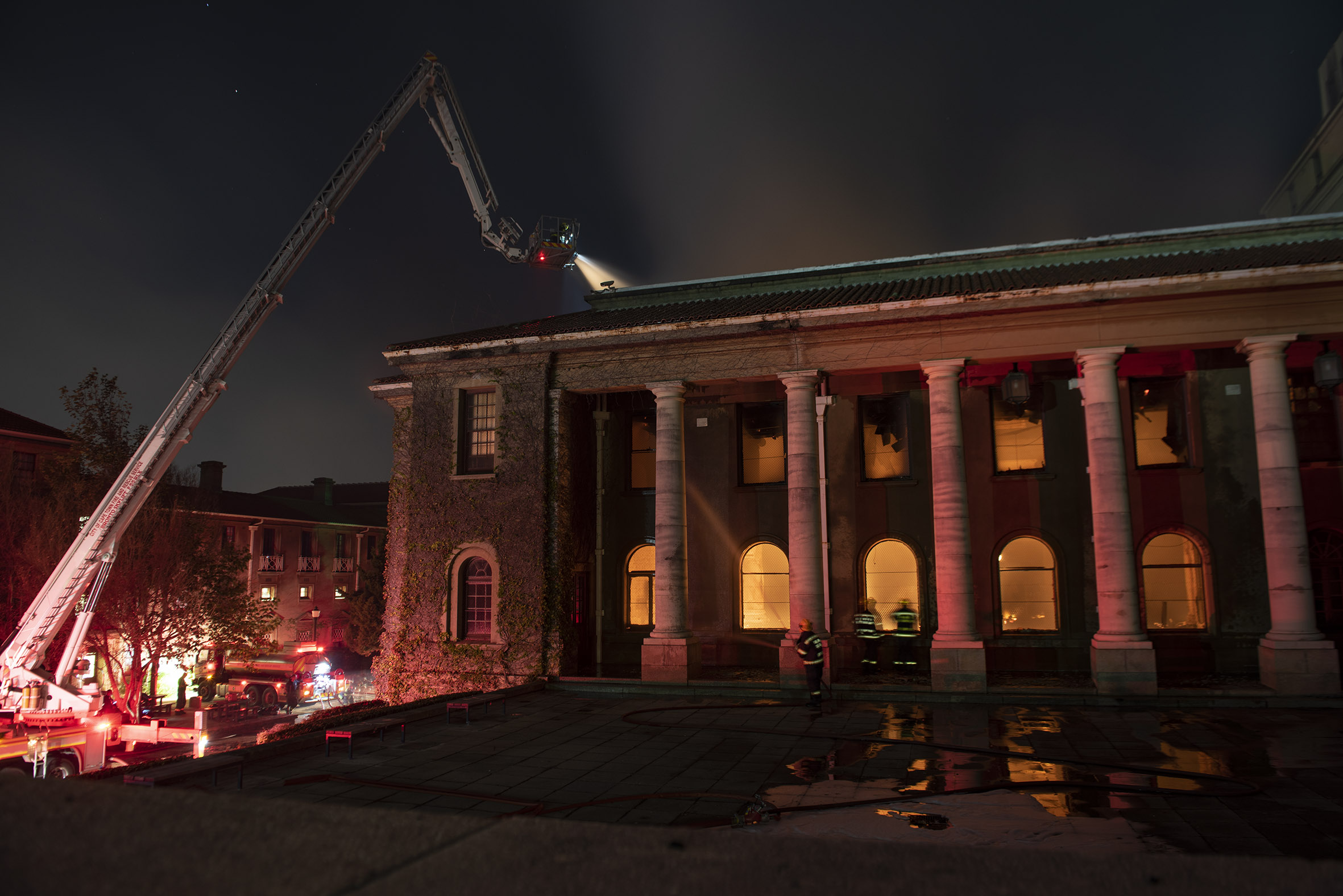I woke up at about 9am on Sunday with the piercing sun forcing its way through my filmy curtains. I got up to open my windows facing the Table Mountain range, a view I look forward to each morning. But, on Sunday I could not clearly see the sun, the mountain and parts of the University of Cape Town that I usually do from my apartment. Instead of a cloth of cloud, it was covered in smoke.
Like many people I took to social media to express my shock and dismay when I learned about the catastrophic events of the runaway veld fire. I posted pictures, threads and retweeted updates of the unfolding apocalyptic-esque horror.
I watched the fire with my heart in my hands — aching, bleeding, pleading, hoping the fire wouldn’t reach the UCT campus. The wind was blowing rougher and harder. I hoped for miraculous rain to extinguish the raging inferno but it wouldn’t relent …
Every time I see a particular image of the burnt-down Jagger Library, my heart sinks, it breaks into pieces and spills onto the floor.
We aren’t catching a break, it’s tragedy after tragedy, trauma after trauma, loss after loss, there is no time to process what just hit us, and then there is more — pain, grief, shock. It’s all so devastating because we are forced to carry on like nothing happened; be productive and functional human beings.
So, I was triggered by some on Twitter who expressed their schadenfreude and/or indifference at UCT suffering irreparable loss and damage — thousands of rare books, equipment and important African heritage gone. How can people celebrate the demise of the African Studies Library which contained precious archives in African languages such as the great isiXhosa dictionary? I get that people are angry at the lack of transformation or accessibility for locals at the institution, but celebrating the burning down of our universities is not the revolution or decolonisation any of us should envisage.
As the well-known African proverb goes: “When two brothers fight, strangers always reap the harvest”. I strongly believe there is a better way to ask for access to free, better and accessible higher education without harming our existing channels of knowledge. We can talk about hierarchies and exclusions without erasing the archives.
An eye for an eye makes the world blind.
I am disappointed that some people lack the dexterity to read the room and are instead playing “Oppression Olympics” and using this tragedy to settle old scores. They refuse to sympathise with traumatised, evacuated and displaced students, researchers and management who work hard to ensure that UCT remains the best institution in Africa — for the advancement of all humanity.
I have a very interesting relationship with UCT, personally, structurally, systemically and otherwise. I am an alumni and current employee at the university. I graduated cum laude after having been academically excluded and destitute in my first year. I have suffered loss, failure, racism and other oppressions in the institution that sought to break me and in many ways did. I even started #ITOOAMUCT with a friend to bring about awareness of the injustices and also took part in the Rhodes Must Fall protests.
Equally, I have heart-warming and inspiring stories; I became a student leader, made history and even became a globetrotter because of the same institution. I have a personal stake in that complex space.
UCT is not just a colonial remnant, it is a living space where many young, diverse and dedicated individuals are reimagining what it means to be an African university and not just a university in Africa.
The African Studies Library is where I used to do my honours and now my PhD research and archival work; exploring old maps and documents. The loss is incalculable and the impact is earth-shattering. I only hope that most, if not all of them, had been digitised. Still, even if they were it will never make up for the real, hard copies that one could touch and smell. The loss of tangible heritage is gut-wrenching.
Another apt African proverb comes to mind: “When an old man dies, a library burns to the ground.” I shudder to think about how many old [wo]men die when a library burns to the ground? How many people have lost knowledge that could have enriched them intellectually? I personally think I have died a hundred times because of it. The continent will feel the impacts of this tragedy for generations. Africans value knowledge, even though our books are in our heads and just as the institution was beginning to feel the winds of change, this horrific event happened. I am beyond sorrowful and sombre at what UCT has lost.
UCT is not perfect, it has meted out a lot of epistemic and ontological violence against black people in this country and treated our weltanschauungen as the “other” that does not belong inside doors of higher learning as Dr Lwazi Lushaba captured in his infamous open letter from years ago. But, it is also a home where my mind was shaped and continues to be sharpened in the presence of internationally acclaimed scholars.
I am the critical, budding academic that I am because of this institution. I know many more young black people who owe their success to that “ivory tower”. I will continue to slam anyone who distastefully celebrates our heartbreaking pain.
This tragedy also brings into memory the recent and, at times, violent student protests at the university wherein fire was used as a form of protest: paintings were set alight during the Shackville pandemonium, burning tyres blocked roads and police vans as well as buses were torched. Perhaps the reality and damage the fire meted out at UCT now and the resulting trauma will make us ponder fire as a very dangerous tool, one that can destroy even the things we are fighting to gain.



